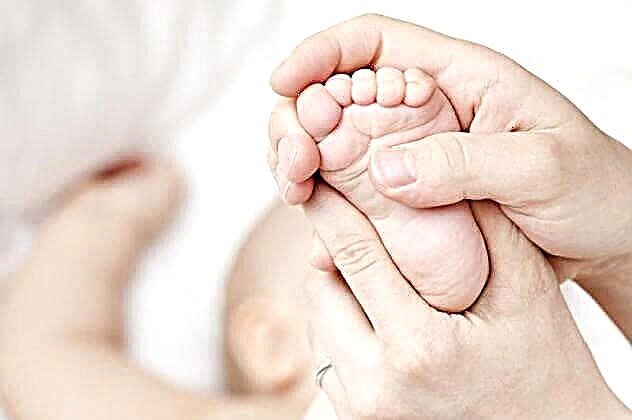The first bricks in the foundation of the health of the future baby must be laid nine months before his birth, as well as during the first years of his life. Of course, one cannot discount the importance of the genetic factor - a lot depends on what genes the baby receives from its parents, but the responsibility of behavior and the correctness of their actions is just as important.

12 Steps to Baby Health
- Correctly, competently and in advance prepare for future pregnancy. This is the first step to your baby's health. The actions of the majority of young people are distinguished by spontaneity and hasty decision-making: "if you need furniture, let's go and buy it," "went on vacation - the next morning a flight was scheduled. Accustomed to acting in this way, many women do not prepare for pregnancy and do not know at all what to do when they find themselves in an “interesting position”. Since most often a woman finds out about her pregnancy by the end of 6-8 weeks, many very important actions to ensure the health of the unborn child are never done. Therefore, every woman who can potentially become a mother "today" would like to give some very important advice. To give birth to a healthy baby, future parents need to lead a healthy lifestyle and pass a number of tests, take a sexually transmitted infection test with your husband, and, if necessary, carry out treatment. In order to reduce the risk of probable fetal malformations, the expectant mother needs to take folic acid. Influenza vaccination is just as desirable. Having made such a vaccination, a woman will reliably protect herself and her child from the action of the virus for the entire duration of pregnancy. Even after the baby is born, the protective effect of this vaccine will continue to spread through breast milk.
- After pregnancy, make your lifestyle sparing. This does not mean at all that from this moment on, the expectant mother should spend half a day in bed. Physical activity is necessary for both her and her unborn child, they just have to become somewhat different. It is better to prefer a leisurely walk in a quiet park to your favorite jogging in stuffy supermarkets (walking in the fresh air, which is an excellent workout for muscles and blood vessels and oxygenates every cell, will prepare the mother's body for childbirth). When going to the cinema, the expectant mother should think carefully about what is more important for her: short-term pleasure or the health of the future baby (after all, in a large cinema there will certainly be carriers of dangerous viruses and bacteria: staphylococci, tubercle bacillus, flu, streptococci). Sometimes an infection (such as rubella or herpes) caught in a crowded area causes a miscarriage or fetal death. You should also take a responsible approach to the choice of places for a long-awaited vacation. From trips to a number of exotic countries (especially island states such as the Maldives, Ceylon or Goa), replete with rare infections and parasites, it is better for a couple expecting a baby to refuse.
- Give birth naturally. A healthy woman should give birth on her own and not by caesarean section. Unfortunately, this operation, not so long ago carried out strictly for medical reasons, is nowadays performed unreasonably often (“by agreement with the doctor”). Natural childbirth is primarily necessary for the child himself. In the process of passing through the birth canal, a powerful activation of the child's body occurs, forcing it to produce a large amount of hormones (norepinephrine and adrenaline) that protect the fetus from hypoxia and prepare it for contact with an unusual external environment, so different from the conditions surrounding it inside the mother's tummy. The caesarean section, which unnaturally reduces the time it takes for an infant to move from one environment to another to an interval of several seconds, is a huge stress for him and is far from harmless to health.
- A woman who has just given birth should insist that the baby removed from the womb (not yet wiped off from the lubricant and not wrapped in a diaper) is immediately applied to her breast. This action is intended to activate two extremely important processes at once: the sucking reflex in the newborn and the onset of lactation in the mother. Colostrum secreted from her breasts in the first days after giving birth is the ideal food for a baby. Containing a large amount of proteins and antibodies, it prepares the baby's digestive system for breast milk and activates his immune system. The components of colostrum have a laxative effect that helps the intestines of the newborn to remove the original feces - meconium.
- Breastfeed your baby. Compulsory breastfeeding for at least six months is a reliable guarantor of the correct development and excellent health of an infant. All sane specialists are tirelessly repeating this, every loving mother should learn this. It depends on her how long the period of breastfeeding will be, since the best lactogonic agent, called "dominant lactation", is the maternal belief that she can and should breastfeed her baby. If there is no such conviction on a subconscious level, milk either will not appear at all, or will disappear very quickly. Having convinced herself that breastfeeding is a duty to the baby, every mother should set herself up to make it as long as possible. This hard work will certainly result in good health of the baby, who does not suffer from allergic reactions, or from frequent colds and all kinds of infections (advice to nursing mothers about HB).
- Walk with your child at least twice a day for one and a half to two hours, remembering that walking with a stroller along a busy highway or visiting shops with a baby in your arms or in a sling has nothing to do with walking. The best place for a walk is a calm green courtyard or a clean city park. A walk in a place devoid of any entertainment may seem boring for a mother, but it is truly invaluable for the health of the baby (and isn't this what you should strive for in the first place?).
- Take care of the timely implementation of preventive vaccinations, revaccinations and Mantoux tests: it is the sacred duty of responsible and competent parents. The very first vaccinations (BCG and hepatitis B) for a newborn should be done while he is still in the hospital. By refusing to vaccinate her child, a mother should be aware that by doing so, she is putting at risk not only his health, but also life itself (vaccination calendar).
- When seeking medical help, never hide from doctors the true picture of what happened to the child. In the practice of any pediatrician, there are many cases when the life of a baby was in the balance of death due to the fact that his parents were afraid to admit that they dropped the crumbs or fed him a "delicacy" (for example, useful and tasty black caviar), which should not be in the children's diet. A truthful story about the event that preceded the baby's poor health will help the doctor quickly make the correct diagnosis and provide him with qualified assistance.
- Don't ignore your toddler's monthly medical check-ups by a pediatrician and a range of specialists (according to the prescribed schedule)... They are necessary so that, having identified the presence of any health abnormalities in a child, the doctor can promptly prescribe the appropriate treatment. Parental carelessness is fraught with the loss of precious time: any defect (for example, congenital dislocation of the hip), the correction of which in infancy would not have been any particular problem, will be much more difficult to correct later.
- Strictly follow the rules for introducing complementary foods. There can be no talk of any confectionery and sausages in the baby's diet (in Russian families this sometimes occurs). The development of the enzymatic system is a gradual process, therefore, the untimely introduction of products from an adult table into the diet of the crumbs can result in indigestion, intestinal dyskinesia, and in especially advanced cases - so-called volvulus (intestinal intussusception) and even death (about the first feeding).
- Never follow the advice of non-professional leading pseudo-medical programs shown on central television channels in anything: this can cause irreparable damage to the health of a small child, therefore, they should not be guided in any case. With all questions regarding the health of the crumbs, you must contact a qualified specialist.
- Trusting doctors, never shift the full responsibility for your child onto them. All actions of caring parents who listen to the medical recommendations received should be aimed primarily at what is really useful and necessary for their baby.
If the child has
- Runny nose. You can suck mucus with an aspirator or your own mouth, rinse the nasal passages with saline or drip the nose with breast milk (how to treat a cold in a newborn);
- The eye began to water or fester. By moistening a cotton swab with saline, you can rinse your eye from the outer corner to the inner corner. Suppuration of only one eye is an alarming symptom that may indicate obstruction of the lacrimal canal. A children's ophthalmologist will quickly fix the problem by probing it;
- The temperature has risen; the baby is hot to the touch. Having undressed the baby, he is quickly wiped off with a damp towel and left in a thin undershirt. After that, you can do an enema using boiled water at room temperature. Bottles filled with the same water can be attached to the groin and armpits. If the temperature rises above 38.5 degrees or convulsions appear against its background, you should give the baby ibuprofen or paracetamol to the baby and immediately call an ambulance. If the baby's arms and legs, despite the high temperature, continue to remain ice cold, you must first warm them up by rubbing each finger thoroughly (after the massage, you can even put on mittens and socks). After that, you can perform all the above actions (how to bring down the temperature of a baby);
- Dry skin (with atopic dermatitis) or diaper rash. Frequent bathing and thorough cleansing of skin folds with a swab soaked in sterilized baby oil will help your baby.
- Apathetic state, lethargy, prolonged lack of appetite, presence of a rash (in the form of small specks that resemble subcutaneous hemorrhages), an incessant piercing cry - all these symptoms are indications for calling a doctor or for immediate hospitalization of the child.
The baby's health is the main value, which loving parents should take care of increasing. Compliance with the simple rules outlined in the materials of our article will help them to provide the optimal conditions necessary for the implementation of this difficult, but extremely important task.



